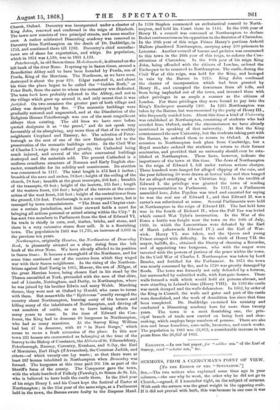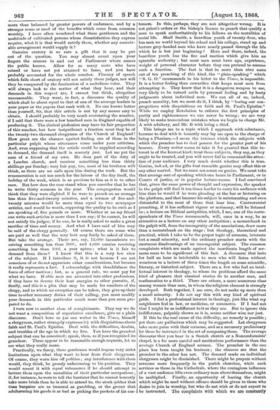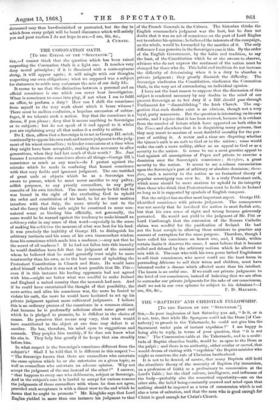SERMONS, FROM A CLERGYMAN'S POINT OF VIEW.
fro THE EDITOR OF TIIE "SPECTATOR."]
SIR,—The two writers who explained some time ago in your columns,—the one why he went, the other why he did not go to Churcb,—agreed, if I remember right, on the subject of sermons. With each the sermon was the great weight in the opposing scale. If it did not prevail with both, this was because in one case it was
more than balanced by greater powers of endurance, and by a stronger sense or need of the benefits which come from common worship. I have often wondered what these gentlemen and the multitude of cultivated persona whose dissatisfaction they express require, what it is that would satisfy them, whether any conceiv- able arrangement would supply it ?
Genuine oratory is so rare a gift that it may be put out of the question. You may almost count upon your fingers the orators in and out of Parliament whose names the public knows. Allow for as many more who have missed or have not yet attained to fame, and you have probably accounted for the whole number. Fluency of speech which falls short of oratory will not satisfy these judges, nor will they be conquered by the fascination of a melodious voice. They will always look to the matter of what they hear, and their demands in this respect are, I cannot but think, altogether unreasonable. They want, in fact, a discourse the quality of which shall be about equal to that of one of the average leaders in your paper or the papers that rank with it. No one knows better than yourself, Sir, that this article is not by any means easy to obtain. I should probably be very much overstating the number, if I said that there were a few hundred men in England capable of producing it. The clerical profession may have its fair proportion of this number, but how insignificant a fraction must they be of the twenty-two thousand clergymen of the Church of England ! How great are the chances against finding one of them in the particular pulpit whose utterances come under your criticism. And, even supposing that the article could be supplied according to demand, the demand itself is scarcely just. Let me put the case of a friend of my own. He does part of the duty of a London church, and receives something less than thirty shillings per Sunday; very fair pay, too, most of his brethren will think, as there are no calls upon him during the week. But the remuneration is not too much for the labour of the day itself, the holiday of the week, which is as precious to him as it is to other men. But how does the case stand when you consider that he has to write thirty sermons in the year. The congregation would think that they were slighted if he were to preach on an average less than five-and-twenty minutes, and a sermon of five-and- twenty minutes would be more than equal to two newspaper articles, and would be worth, supposing the quality to be such as I am speaking of, five pounds or more. Whether or no my friend can write such articles is more than I can say; if he cannot, he will not satisfy his judges; if he can, he is really asked to make a great sacrifice of time and money. And what I have said of him may be said of the clergy generally. Of course there are some who are paid so well that the very best may fairly be asked of them. But take the average. There are, say, 12,000 incumbents re- ceiving something less than 300/., and 4,000 curates receiving something less than 100/. a year apiece ; what is it fair to demand from them ? I know that this is a very low view of the subject. If I introduce it, it is not because I am not conscious of or do not appreciate other considerations, but because it really represents a fact. I acknowledge with thankfulness the force of other motives ; but, as a general rule, we must pay for what we have. If able men are attracted into other professions, if they have to devote their best energies to other pursuits, if, finally, and this is a plea that may be made for numbers of the clergy, and to which no exception can be taken, they give up their time to other necessary duties of their calling, you must modify your demands in this particular much more than you seem pre- pared to do.
I turn now to another class of complainants. They say we do not want a composition of superlative excellence, give us a plain discourse. Don't bore us (as one writer in the Times, himself a clergyman, rather strangely expresses it) with disquisitions about faith and St. Paul's Epistles. Deal with the difficulties, doubts, and troubles of the age in which we live. You have the grandest subject that can be conceived ; speak, then, as if you recognized its grandeur. These appear to be reasonable enough requests, let us see what they really mean.
Practically, we fancy, these gentlemen would impose very strict limitations upon what they want to hear from their clergyman. Of course, they warn him off politics ; any interference with them would, they think, be grossly unbecoming to his position. They would resent it with equal vehemence if he should attempt to lecture them upon the moralities of their particular occupations ; if, for instance, hewere to tell the barrister that he cannot honestly take more briefs than he is able to attend to, the stock-jobber that time bargains are as immoral as gambling, or the grocer that adulterating his goods is as bad as picking the pockets of his cue-
tomers. In this, perhaps, they are not altogether wrong. It is not priest's orders or the bishop's licence to preach that qualify a man to speak authoritatively to his fellows on the moralities of social life. Shall Smith, a beardless youth of twenty-four, who has seen no world beyond his school and his college, stand up and lecture grey-headed men who have nearly passed through the life which he is but just beginning ? Here and there, indeed, the beardless youth has the fire and unction which give him an apbstolie authority ; but most men must have age, experience, weight of personal character before they can pretend to assume such a function. The fact is that in more than nine cases out of ten preaching of this kind, the "plain-speaking" which "S. G. 0." recommends in his letter to the Times, is impossible. It is a better feeling than cowardice that keeps most men from attempting it. They know that it is a dangerous weapon to use, very likely to be turned aside by personal feeling and by hasty judgments about individual men. We can all of us, indeed, preach morality, but we must do it, I think, by "boring our con- gregations with disquisitions on faith and St. Paul's Epistles." While we employ Revelation to enforce the first principles of purity and righteousness we can never be wrong ; we are very likely to make tremendous mistakes when we begin to charge Mr. A with adultery, and Mr. B with being a thief.
This brings me to a topic which I approach with reluctance, because to deal with it honestly may lay me open to the charge of being a Pharisee,—I mean the interest which the subjects with which the preacher has to deal possess for the greater part of his hearers. Every writer seems to take it for granted that this in- terest is of the keenest kind; treat those subjects, they say, as they ought to be treated, and you will never fail to command the atten- tion of your audience. I very much doubt whether this is true. Genius, indeed, or the gifts that resemble genius may effect this or any other marvel. But we must not count on genius. We must take that average sort of speaking which one hears in Parliament, or in Courts of justice, or in popular lecture-rooms. I feel convinced that, given the same power Of thought and expression, the speaker in the pulpit will find it tea times harder to carry his audience with him than he would if he were pleading at the bar or lecturing on the platform, and that because his subject is uninteresting and even distasteful to the most of those that hear him. Controversial preaching, if it has sufficient vigour or acrimony, will be listened to ; a lecture on Biblical antiquities, which, I see, one of the corre- spondents of the Times recommends, will, once in a way, be as attractive as a lecture on any other antiquities ; a mountebank in the pulpit will, from the incongruity of the associations, draw more than a mountebank on the stage ; but theology, theoretical and practical, which I take to be the proper topic of sermons, interests but a small minority, and the ordinary preacher starts with the enormous disadvantage of an uncongenial subject. The common complaints which are made against the inordinate length of ser- mons seem to be significant of this fact. A discourse that lasts for half an hour is intolerable to men who will listen without weariness to a lecture of three times the length on some scientific, literary, or historical subject. There are a few who feel an intel- lectual interest in theology, to whom its problems afford the same kind of pleasure that classical stories do to another man, and mathematics to a third. There are others, a more numerous class among women than men, in whom the religious element is strongly developed. Both together, I am sure, do not make up more than a small minority. I do not say this with any kind of spiritual pride. I feel a professional interest in theology, just like what my neighbours feel in law, or medicine, or commerce. If I had not that I might be as indifferent to it as they are. But to ignore this indifference, palpably shown as it is, seems neither wise nor just.
If this be the real cause of the difficulty, no remedy is possible ; yet there are palliatives which may be suggested. Let clergymen take more pains with their sermons, and as a necessary preliminary let them be instructed in the art of composing them. The average discourse that you hear in a Scotch church or a Nonconformists' chapel, is a far more careful and meritorious performance than the average Church of England sermon. The preacher in the one place has been taught his business ; the chances are that the preacher in the other has not. The demand made on individual clergymen might be diminished. There might be prayers without sermons more frequently in the parish churches, while such services as those in the Cathedrals, where the contagious influence of a vast audience lifts even ordinary men above themselves, might be multiplied. Finally, an opportunity of leaving the church which might be used without offence should be given to those who desire to join in worship, but who do not wish or do not expect to be instructed, The complaints with which we are constantly
distressed may thus bosdiminished or prevented, but the day in which from every pulpit will be heard discourses which will satisfy you and your readers I do not hope to see.-1 am, Sir, &c.,
A CURATE.
































 Previous page
Previous page